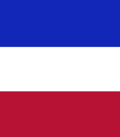President of the Slavic Union
| President of the Slavic Union | |
|---|---|
| Prezident Slavyanskogo Soyuza | |
 Presidential Standard | |
| Style | Mr/Madame President |
| Status | Head of State Executive President |
| Appointer | Direct Popular Vote |
| Term length | 4 Years, renewable once |
| Precursor | Vozhd |
| Formation | 2021 |
| Deputy | Deputy President |
The President of the Slavic Union (Slavic: Prezident Slavyanskogo Soyuza) is the head of state and head of executive of the Slavic Union, as well as the commander in chief of the Slavic Armed Forces. As the presidency is the supreme magistracy of the country, the officeholder is the holder of the highest office in the Slavic Union.
Until 2021 the Vozhd acted as an autocratic head of state and government. But was overthrown in the August Revolution.
History
On September 4, 2021 the Slavic constitution was ratified, one month later Ulyana Agapova was elected the first President of the Slavic Union.
Election
The Constitution of the Slavic Republic states that the President of the Slavic Union is directly elected by universal suffrage.
Slavic presidential elections are conducted using run-off voting, which ensures that the elected president always obtains a majority: if no candidate receives a majority of votes in the first round of voting, the two highest-scoring candidates arrive at a run-off.
Powers
The Slavic Union has a semi-presidential system. Although the prime minister of the Slavic Union oversees much of the nation's actual day-to-day affairs (especially in domestic issues), the Slavic president wields significant influence and authority, especially in the fields of national security and foreign policy.
The president's greatest power is the ability to choose the prime minister. However, since the Slavic Chamber of Deputies has the sole power to dismiss the prime minister's government, the president is forced to name a prime minister who can command the support of a majority in the chamber.
•The President can veto laws that have received the support of 50 or fewer Senators and 166 or fewer Deputies, if they have received more than that level of support he can call for a popular referendum on the condition this is supported by the Prime Minister.
•The president is the chief of the Armed Forces.
•The president receives foreign ambassadors.
•The president may grant a pardon (but not an amnesty) to convicted criminals; the president can also lessen or suppress criminal sentences.
Succession
Upon the death in office, removal, or resignation of the president, the President of the Chamber of Deputies, known as the Deputy President takes over as acting president. They will serve out the rest of the presidents term.
If the president is travelling abroad, ill, undergoing surgery or generally temporarily unable to perform his duties the Deputy President will act in his stead. The Deputy President also attends meetings the President is unable to attend.
List of Presidents
|
President of the Slavic Union | |||||
| No. | Portrait | Name (Birth-Death) |
Term of office | Political Party | |
| 1 | 
|
Ulyana Agapova (Born 1979) |
11 October 2021 |
Present | Green Union |
Next Election
Main Article: 2025 Slavic presidential election